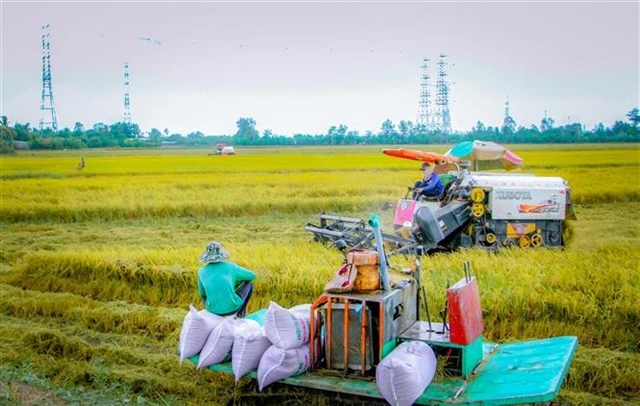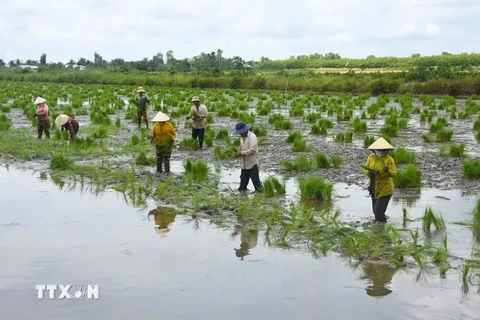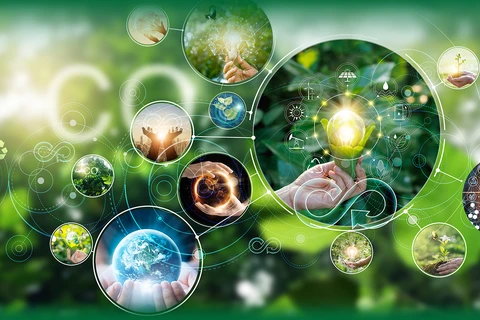
Hanoi (VNS/VNA) - As the world's fifth-largest rice producer, Vietnam has tremendous potential to generate revenue from by-products such as straw, husk and bran, as well as to adopt ecological and circular farming practices, according to industry insiders.
According to the Ministry of Agriculture and Rural Development (MARD), Vietnam's Mekong Delta region alone produces about 25 million tonnes of rice annually, with tens of millions of tonnes of straw, millions of tonnes of husk and bran. However, the by-products have been left unused, often resulting in waste of valuable resources.
To make matters worse, the majority of local authorities have not prioritised cutting down carbon emissions, as their focus has often been economic and food security objectives.
According to Le Thanh Tung, Deputy Director of the Crop Production Department under MARD, the region produces around 24 million tonnes of straw yearly but just a mere 30% are collected. Farmers, following old practices, often burn the leftover straw on the fields to make fertiliser, adding to higher emissions.
"Circular agricultural practices hold the key to increasing income for farmers while reducing emissions at the same time. To develop circular agriculture, local administrations must start with building databases, planning and implementing models to collect the by-products," Tung said.
"Data and technology play important roles in developing and supporting circular agricultural practices and should be made readily accessible to farmers and local governments," he added.
The practices are said to hold great economic potential. With over 40 million tonnes of straw produced yearly across the country, efficient recycling and reuse can deliver significant benefits to farmers while contributing to Vietnam's commitments made to the international community to reduce the country's emissions.
Nguyen Van Hung, an expert at the International Rice Research Institute Vietnam Office, said developing circular agriculture required support policies for farmers, cooperatives, and market monetisation.
Hung said the institute was ready to collaborate, share, and provide databases, system designs, and agricultural circular economy value chains, as well as introduce new technologies and applications to the rice industry.
Phan Van Tam, Deputy General Director of the Binh Dien Fertiliser JSC, said it was necessary to strategise and plan comprehensively to start generating income from the by-products. Other elements, including transportation, processing and supporting infrastructure are all crucial.
In addition, measures must be taken to draw in investment from domestic and foreign investors, incentives for farmers, simplified administrative procedures and greater transparency.
"The Binh Dien Fertiliser JSC has been working closely with the institute and scientists to make organic fertiliser. We have also been working with local cooperatives to build a stronger network to collect and transport the by-products," Tam said.
Pham Thi Minh Hieu, Director of the Crop and Plant Department in Can Tho city, one of the largest rice-producing localities in the Mekong Delta, said farmers in the city had started the implementation of the new practices.
"Several farmers reported their income reached 133 million VND (5,250 USD) per hectare using the new practices, nearly double their income from traditional practices," he said.
Hieu said the municipal administration had set several targets in supporting farmers using the new practices to cut production costs, increase profits and protect the environment. The authorities also aim to expand the new practices across the entire province, as well as the Mekong Delta.
Deputy Minister of Agriculture and Rural Development Tran Thanh Nam said that in light of the adverse effects caused by climate change, Vietnam's rice industry must adapt by rapidly adopting circular agricultural practices to optimise resource use, minimise waste and preserve the environment.
"The ministry considers circular agriculture a top priority with 1 million hectares of high-quality rice being cultivated and more making the switch in the future," he said.
2.7 billion USD rice farming project
Vietnam is expected to require approximately 2.7 billion USD to carry out its high-quality rice cultivation project spanning one million hectares by 2030, according to an official from MARD.
At a June 29 meeting involving the Ministry of Planning and Investment, the MARD and Mekong Delta localities, discussions focused on utilising World Bank loans to support a project developing 1 million hectares of high-quality, low-emission rice cultivation in the region.
Ton That Son Phong, deputy head of the MARD’s agricultural project management board, emphasised the urgency of mobilising international resources due to limited domestic funding.
To this goal, MARD has proactively worked with many international organisations such as the WB, the Asian Development Bank (ADB), the SNV Netherlands Development Organisation, and the International Rice Research Institute (IRRI). To date, the WB has committed to providing loans and technical assistance, while the IRRI and several other organisations have pledged to provide technical support.
Based on the WB's commitment, representatives from the MARD, 12 provinces and Can Tho city in the Mekong Delta, and other ministries and sectors have directly worked with the WB and domestic and international experts to complete a draft project on infrastructure and technical support for high-quality, and low-emission rice farming in the region.
The draft project is expected to be submitted to the Prime Minister for consideration and approval in the third quarter of 2024. Its investment is estimated at 430 million USD, of which 330 million USD will be financed by loans from the WB.
Cao Thang Binh, a senior expert of the WB, said that this is the first time Vietnam and the world have a large-scale project on rice production towards sustainable growth and emissions reduction. Vietnam is at a golden time to implement the project of 1 million hectares of high-quality rice, and this is a way for the country to promote and reposition the Vietnamese rice brand, its responsibility for rice production, and raise its position in the world.
According to Binh’s preliminary calculations, if the investment for the whole project is about 1 billion USD, it will generate a profit of about 4 billion USD. It will also cut down production costs and fertilisers by about 30%.
The project to develop 1 million hectares of specialised rice cultivation with high quality and low emissions associated with green growth in the Mekong Delta region was approved by the Prime Minister on November 27, 2023.
It is part of efforts to restructure the region's production system and value chain with a focus on sustainable farming practices, higher product value, greater business and production efficiency, as well as improved livelihoods of rice farmers, in accordance with Vietnam's commitment to protect the environment, adapt to climate change and reduce greenhouse gas emissions./.






















